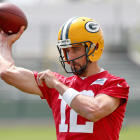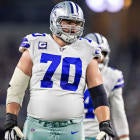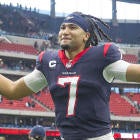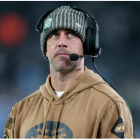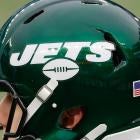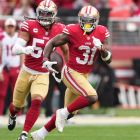NFL business typically comes to a grinding halt when mandatory minicamps end in the middle of June. Things start picking back up the week following the Fourth of July.
A couple of rookie deals were completed and a few suspensions were announced during this year's lull. Most notably, 2018 fifth-overall pick Bradley Chubb signed a fully guaranteed four-year contract for slightly under $27.3 million.
Here's a look at some key unfinished offseason financial matters, some of which should be completed prior to most training camps opening later this month.
Aaron Rodgers' contract extension
The expectation was the Packers and Rodgers would quickly reach an agreement on a new deal after Falcons quarterback Matt Ryan became the NFL's first $30 million-per-year player in early May. Ryan's five-year contract extension, which includes NFL records of $100 million in overall guarantees and $94.5 million fully guaranteed at signing, set a salary floor for Rodgers. A new contract doesn't appear to be imminent, although Packers president Mark Murphy is hopeful about signing the two-time NFL MVP to an extension soon.
Rodgers, whose contract with runs through the 2019 season, is reportedly seeking a clause allowing him to opt out of the deal at some point. Clauses giving the players the latitude to void remaining contract years at their discretion are a rarity in the NFL.
The Packers have little incentive to give Rodgers the opt-out clause. Realistically, Green Bay can control his rights over the next four seasons by paying him slightly more than $107 million, where he plays out his contract and is designated as a franchise player twice. Rodgers wouldn't get his first chance to potentially hit the open market until 2022 as a 38 year old.
A conventional deal (without an opt-out clause) would probably be in the $32 to $33 million-per-year neighborhood. Whether Rodgers would eclipse Ryan's guarantees marks would be debatable considering Packers contracts typically have a vanilla structure. The guarantees are usually less than comparable deals on other teams but an exception has been routinely made for Rodgers.
Desperately wish you had a 30-minutes-or-so, daily NFL podcast in your podcast app every morning by 6 a.m.? Put some Pick Six Podcast in your life and join Will Brinson as he breaks down the latest news and notes from around the league, as well as the win totals on a team-by-team schedule. It's a daily dose of football to get you right for that commute or gym trip. Subscribe: via iTunes | via Stitcher | via TuneIn | via Google Play
The franchise player negotiating deadline
Browns wide receiver Jarvis Landry is the only one of the five players designated as a franchise player to sign a long-term deal. Cleveland gave Landry a five-year, $75.5 million deal with $47 million in guarantees. The other four players with franchise tags (Lions defensive end Ziggy Ansah, Steelers running back Le'Veon Bell, Rams safety Lamarcus Joyner and Cowboys defensive end Demarcus Lawrence) have until 4 p.m. ET on July 16 to sign multi-year contracts. They must wait until the 2018 regular season ends to sign long-term once the deadline passes. All but Bell, whose franchise tag is for $14.544 million, have already signed their respective one-year tenders. Joyner's is $11.287 million. As defensive ends, Ansah and Lawrence get one-year salaries of $17.143 million each.
Lawrence has a great attitude about being franchised. He views playing on the tag as an opportunity to break the bank in 2019 if a long-term deal isn't reached. The Cowboys and his representatives are reportedly meeting sometime this week to discuss a deal. Negotiations probably won't get too far if the Cowboys aren't willing to offer Lawrence more than the $17 million per year that defensive end Olivier Vernon received from the Giants as an unrestricted free agent in 2016. Vernon's five-year deal contains $52.5 million in overall guarantees, of which $40 million was fully guaranteed at signing. This contract is particularly relevant because Vernon and Lawrence have the same agent.
Bell has been surprisingly optimistic about a new deal given that he reportedly wants $17 million per year, like wide receiver Antonio Brown got from the Steelers in an extension last year. An agreement seems unlikely unless Bell softens his financial demands. Bell didn't sign his franchise tender until right around Labor Day last year. Expect a similar timetable with Bell again if he's playing another year on a franchise tag.
Offsets in first-round contracts
Just three of the first 10 picks of the 2018 NFL draft are signed even though there are very few negotiable items with rookie deals due to the 2011 Collective Bargaining Agreement implementing a rookie wage scale. Chubb, the Broncos' edge rusher, is the only top-five pick under contract.
The primary sticking point is whether the guarantees will have offsets. An offset clause allows a team to reduce the guaranteed money owed to a player when he is released by the amount of his new deal with another team. The player receives his salary from the team that released him in addition to the full salary from his new contract with another club when there isn't an offset (also known as "double dipping"). An offset should only come into play in the latter years of a rookie deal if the player hasn't lived up to expectations.
Nearly every team requires offsets with salary guarantees in draft-pick contracts. It's been that way since 2013, when teams took a stand with the top selections. A massive reversal five years later seems remote. As a compromise, a lot of teams structure deals containing minimum base salaries in the final three years with the remainder of a player's salary in annual fully guaranteed third- or fifth-day-of-training-camp roster bonuses.
Quarterbacks have the best chance of extracting a concession on offsets than players at other positions. Mitchell Trubisky, the second-overall pick in 2017, signed a deal with the Bears where his 2017 base salary and training camp roster bonuses in 2018 through 2020, which contain most of the money in the last three years of his contract, don't have offsets. Marcus Mariota, the second-overall pick in 2015, received similar treatment from the Titans.
The nature of the rookie wage scale has practically eliminated rookie holdouts. This didn't prevent the Chargers and 2016 third-overall pick Joey Bosa from engaging in a contract dispute in which he missed 31 days of training camp before signing. Bosa's guarantees have offsets but he got a better payment schedule with his signing bonus than the Chargers typically give to players with substantial upfront money. It remains to be seen whether any of the top picks (or more importantly their agents) feel as strongly about offset language as Bosa's camp did.
Resetting the non-QB market
It's been a foregone conclusion that Rams interior defensive lineman Aaron Donald and Raiders edge rusher Khalil Mack, who are scheduled to make $6.892 million and $13.846 million respectively this year on their fifth-year options, would eventually become charter members of the $20 million-per-year non-quarterback club. Raiders general manager Reggie McKenzie's timetable for a Mack extension has been the 2018 offseason ever since locking up quarterback Derek Carr long-term last summer. Les Snead, McKenzie's counterpart with the Rams, has called a new deal for Donald a major priority.
The Raiders and Rams having sticker shock is the likely impediment with deals for the 2014 first-round picks. A modest increase over the current non-quarterback standard, which is Broncos linebacker Von Miller at $19,083,333 per year and $70 million in overall guarantees, may not be enough to end the stalemates. The substantial growth in quarterback salaries over the last year with the non-quarterback market remaining stagnant is a stumbling block. It is my understanding that restoring the traditional financial relationship between the highest-paid quarterback and non-quarterback which has existed under the current CBA is an important consideration to the players' representatives. This would mean a contract averaging over $23 million per year with $85 million in guarantees where $65 million to $70 million is fully guaranteed at signing is needed in order to recreate the balance. Not surprisingly, there is reluctance to dramatically reset the non-quarterback market.
Both Mack and Donald skipped last month's mandatory minicamp. Their absences, especially Donald's, extending into training camp should be expected unless new deals are signed. Donald had a lengthy holdout last year, which lasted until the end of the preseason.
Minicamp holdouts
Several notable veterans under contract were willing to risk incurring a fine of almost $85,000 for missing last month's mandatory three-day minicamp. In addition to Mack and Donald, Cardinals running back David Johnson, Falcons wide receiver Julio Jones, Titans left tackle Taylor Lewan and Seahawks free safety Earl Thomas were minicamp no-shows. Giants wide receiver Odell Beckham, Jr. and Patriots tight end Rob Gronkowski, two other prominent players seeking new contracts, attended their team's camp.
Jones is unhappy with the five-year, $71.25 million extension he signed in 2015, which briefly made him the NFL's highest-paid wide receiver. The Falcons are reportedly receptive to addressing his contract. Extending the five-time Pro Bowl wide receiver's contract would be a departure from league convention. It is unusual for teams to renegotiate a player's contract with three years remaining. The more likely scenario is for the Falcons to make a minor adjustment to Jones' deal by adding incentives or increasing his 2018 compensation by taking money from his 2019 base salary. Other teams have done these things when elite players who felt underpaid were at similar stages of their contracts.
Thomas, who is in the final year of a four-year extension signed in 2014 averaging $10 million per year, has vowed he wouldn't participate in any of Seattle's team activities until his contract situation is resolved. There reportedly hasn't been any meaningful dialogue about a contract since early March during the NFL combine. The Seahawks haven't been opposed to trading Thomas for the right price. The Cowboys are considered the most likely destination because Kris Richard, who was Seattle's defensive coordinator the last three seasons, is the Cowboys' secondary coach.
Johnson's minicamp absence was surprising since there reportedly have been constructive talks about a new deal and he missed almost all of the 2017 season due to a broken left wrist. Johnson was arguably the NFL's best dual-threat running back during a breakout 2016 campaign in which he led the NFL with 2,118 yards from scrimmage while earning first team All-Pro honors. Unfortunately for Johnson, elite running back salaries have been steadily declining in recent years. He would benefit tremendously from Bell jump-starting the market with a new contract before the mid-July deadline for franchise players to sign multi-year deals.
It's likely going to require the Titans resetting the tackle market to sign Lewan, who is scheduled to make $9.341 million this season on his fifth-year option, long term. Nate Solder raised the bar for tackles with the four-year, $62 million contract containing $34.8 million fully guaranteed he received from the Giants this offseason in free agency.
The penalties are more severe for a training-camp absence. A team can fine a player a maximum of $40,000 for each day missed. Training camps typically run from 35 to 40 days. Missing all of camp would subject a player to approximately $1.5 million in fines. A team can also recover a portion of a player's signing bonus. Fifteen percent of the prorated amount of signing bonus can be recouped on the sixth day of a training camp holdout. It's one percent for each additional missed day with a maximum of 25 percent of the prorated amount during training camp. The recoupment increases when a holdout extends to the regular season.
Veteran free agents
There are usually veteran player signings right before training camps open and during the preseason. For some of the veterans, a conscious decision to wait has been made because the free-agent market hasn't been to their liking. A few will further delay signing in hopes of gaining some contractual leverage through a training camp or preseason injury. That's what happened with quarterback Jay Cutler last year. Ryan Tannehill's season-ending knee injury last August prompted the Dolphins to sign Cutler to a one-year, $10 million deal with an additional $3 million in incentives.
Wide receiver Dez Bryant turned down a three-year contract from the Ravens believed to be averaging $7 million per year shortly after the Cowboys released him in mid-April. His patience won't be rewarded if recent history is any indication. The most lucrative wide receiver deals over the last couple of years for players first hitting the open market after April belong to Jeremy Maclin and Eric Decker, both of whom are currently free agents. Maclin, who was cut by the Chiefs last June, signed a two-year, $11 million deal worth a maximum of $14 million through incentives several days later. It took Decker less than a week to land a one-year, $4 million contract (worth up to $5.5 million with incentives) once the Jets let him go last year right before the start of minicamp.
The safety market has been extremely soft. Eric Reid's significant role in the national anthem protests is a contributing factor in his availability. Reid filed a grievance against the NFL in early May alleging collusion because of his lack of employment. Tre Boston, who intercepted five passes last season, and Kenny Vaccaro, a starter in 67 of the 68 NFL games he has played, are also unsigned. There has been speculation that Boston and Vaccaro are collateral damage of the Reid saga.
Other prominent veterans who are available include defensive end/outside linebacker Conor Barwin, inside linebacker NaVorro Bowman, defensive back Dominique Rodgers-Cromartie and running backs DeMarco Murray and Adrian Peterson.








